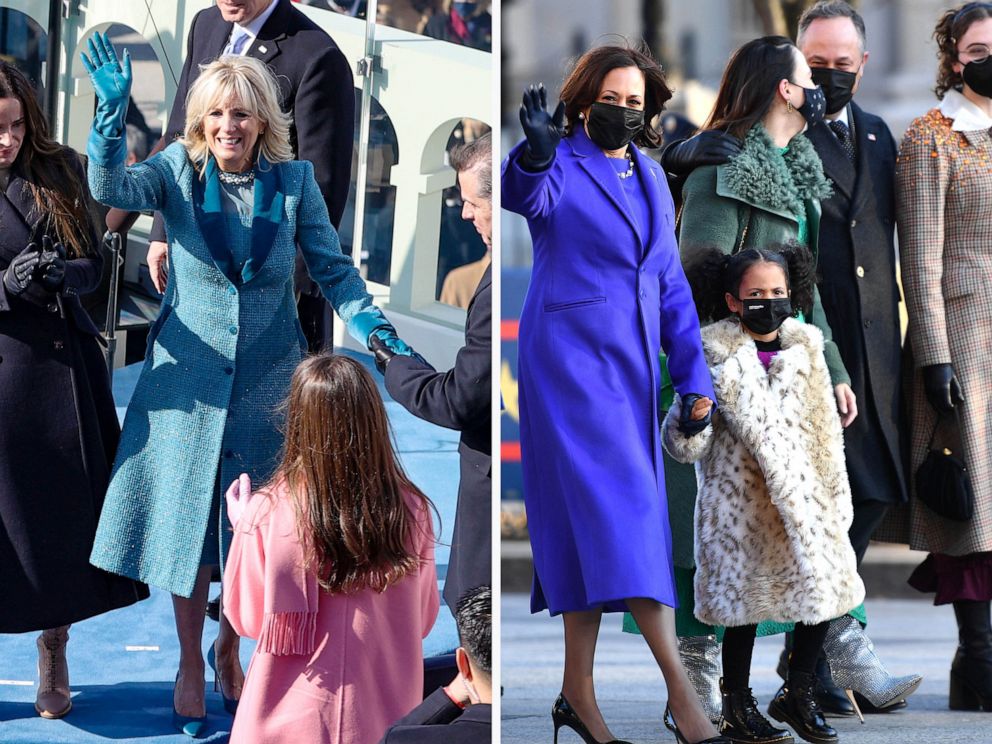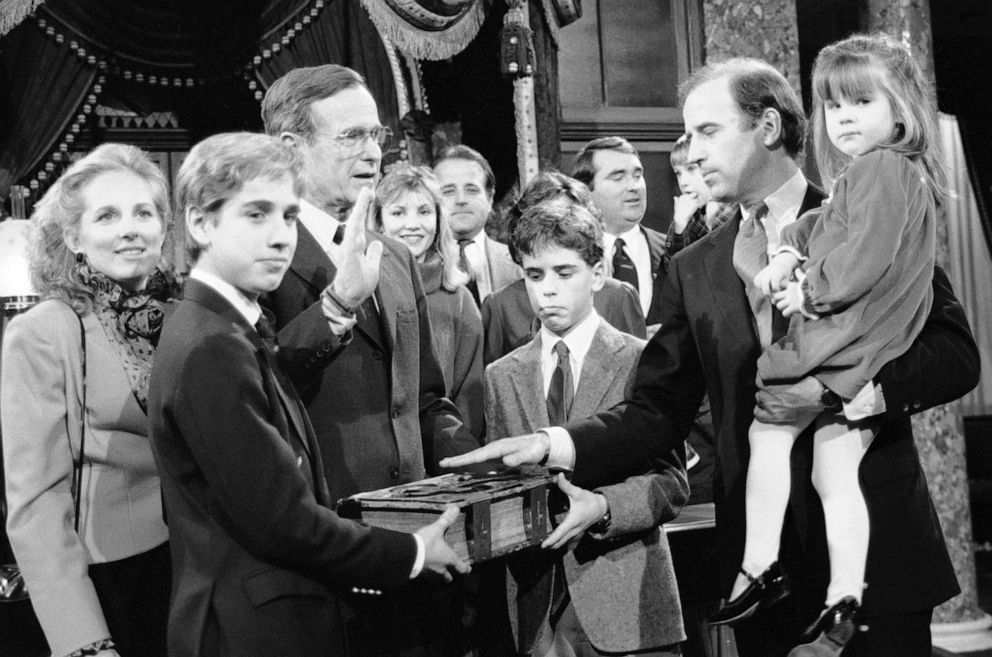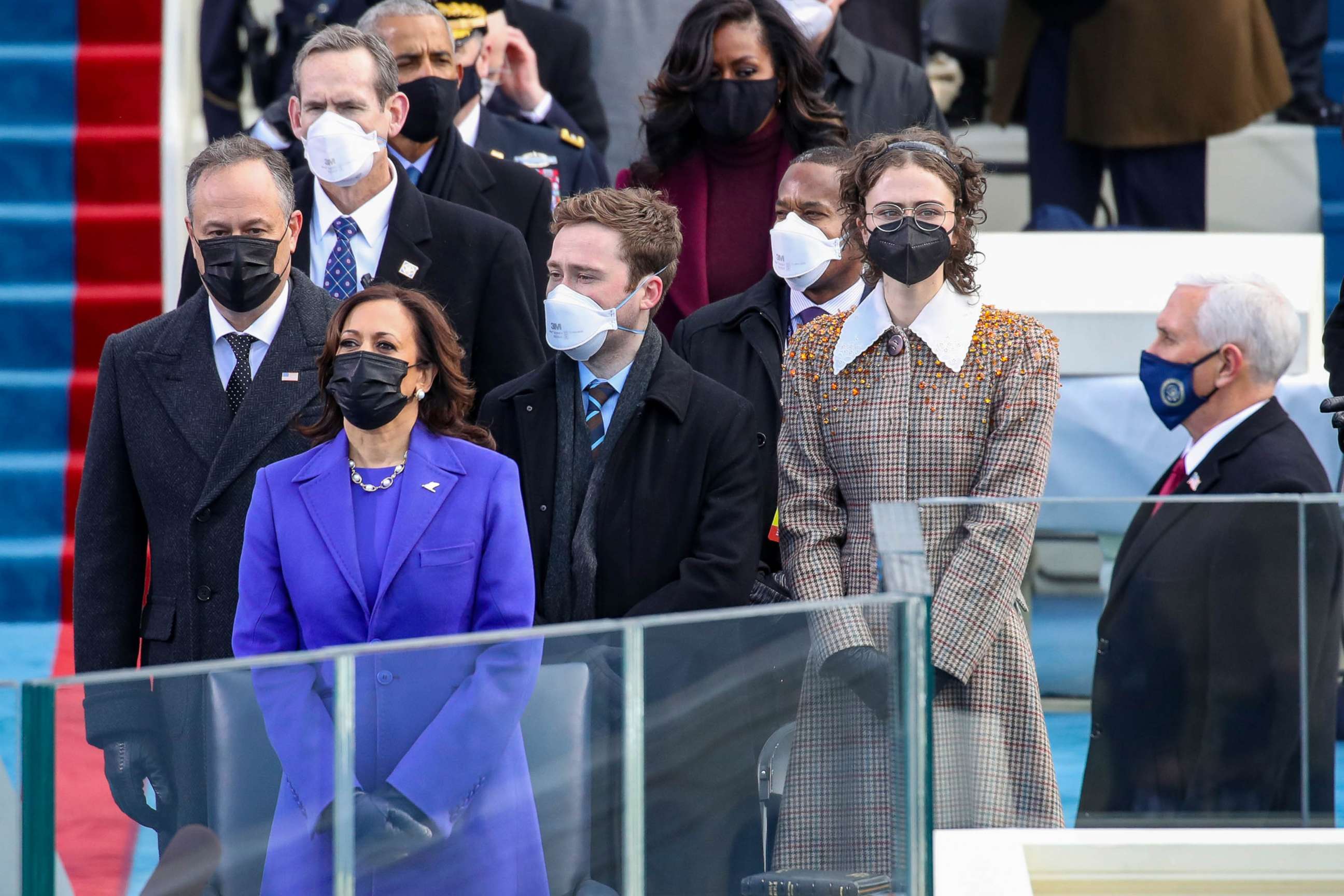First lady, Vice President Harris highlight different paths to motherhood
They have also put a spotlight on economic issues for moms during the pandemic.
With families around the country preparing to celebrate Mother’s Day on Sunday, first lady Jill Biden and Vice President Kamala Harris are putting a new national spotlight on less traditional types of motherhood.
The two most high-profile women in the Biden administration came to motherhood in different ways but share one common thread: They both stepped into the role as stepmothers. And as Biden and Harris have settled into their prominent roles, they’ve also sought to highlight the issues mothers face, particularly in the face of the COVID-19 pandemic.
Though neither went by the title of "stepmother," their paths to motherhood reflect a shifting of the "typical" American family. According to a 2011 Pew Research study, 42% of American adults have a step relative, whether it's a stepparent, a step or half sibling, or a stepchild.

There have been stepmothers in the White House before, including former first lady Melania Trump who viewed herself not as a stepmother but a “friend” to her husband’s adult children, but never has the country seen both the vice president and first lady highlighting their nontraditional paths to motherhood.
Naja Hall, founder of Black and Blended, an online forum for blended families, and a stepfamily coach, says having "two women that are in the two [of the] highest offices" highlight their roles as stepmothers brings a "feeling of inclusion."
"It shows that it is very possible for people that are in nontraditional families to be very happy and very successful. It shows that -- it kind of proves that just because their family looks different, is deemed 'nontraditional,' it doesn't mean that things have to be in disarray. Kamala Harris' situation and Dr. Jill's show that redemption is real and that stepmothers do represent second chances," Hall added.
'Jill was mom'
At 26, Jill Jacobs became more than just a senator’s wife when she married Joe Biden. She also became a parent to his sons, Beau and Hunter after their biological mother, Neilia, was killed in a car accident along with their sister.
"When we got married, I said I fell in love with the boys, and boy I really did," Biden recalled on ABC's "The View" in 2019. "I mean, I was lucky. I really felt that their mom really gave me a gift, and I had to honor that gift."
In his 2007 memoir, "Promises to Keep," President Biden acknowledged that Jill’s integration into the family took some time, but Beau and Hunter made it clear early on they did not view Biden as a stepparent -- she was "mom" while Neilia would remain "mommy."
Stepping into the role of mom to two young boys came with some challenges and learning curves: the amount of laundry the family could generate, the art of the quick meal and, of course, multitasking as a working educator.
"When my school day was over, I'd grade papers on the bleachers while the kids played whatever sport was in season. Then I'd pile their equipment into our station wagon and rush home for dinner. Every meal I cooked had to take 30 minutes or less—otherwise, the boys would eat an entire bag of chips," Biden wrote in Parents Magazine this year.
A few years into their marriage, she and Biden added to their family with their daughter Ashley -- with Beau and Hunter Biden getting to name their new sister.

Biden also acknowledged the challenges of raising a teenage daughter, writing that she kept sneakers by the door so that she could run out her frustrations when they argued.
"It's not a coincidence that I became a marathoner," she wrote in the magazine.
After nearly 40 years of motherhood, Biden also joined an unwanted club of mothers who have lost a child and spoke openly about the impact Beau's 2015 death had on her.
"You know, you can't lose a child and be who you [are]. You're changed forever," Biden told CBS News in 2020. "You're not the person you were before your child's death. So, yeah, you are broken."
'Momala Harris'
Vice President Kamala Harris’ life was deeply shaped by her own mother. A child of divorce, the vice president has not been shy about crediting her mother with instilling in her the values and lessons that propelled her to the second-highest office in the land.
"When she came here from India at the age of 19, she maybe didn't quite imagine this moment. But she believed so deeply in an America where a moment like this is possible, and so I am thinking about her and about the generations of women, Black women, Asian, white, Latina, Native American women, who throughout our nation’s history, have paved the way for this moment tonight," Harris recalled in her victory remarks in November 2020.
Harris’ own road to motherhood began when she started dating her now-husband, second gentleman Doug Emhoff, who had children -- Cole and Ella, both teenagers when the pair began dating -- from a previous marriage.
In a 2019 essay in Elle magazine, Harris detailed her slow and steady approach to her relationship with Emhoff’s kids -- an approach she says has resulted in a modern, mixed race family that is "almost too functional."
"To know Cole and Ella is to know that their mother Kerstin is an incredible mother. Kerstin and I hit it off ourselves and are dear friends. She and I became a duo of cheerleaders in the bleachers at Ella’s swim meets and basketball games, often to Ella’s embarrassment," Harris detailed in the magazine.
"A few years later when Doug and I got married, Cole, Ella, and I agreed that we didn’t like the term "stepmom." Instead they came up with the name "Momala.""
That nickname, according to Dr. Anne Brennan Malec, a clinical psychologist and founder of Symmetry Counseling, exemplifies the love and affection her stepchildren have for her.

"I think her stepchildren likely would not have called her that unless she really made herself a valued and trusted and loved member of the family. And that comes through work and effort and not a clear playbook on what to do," Brennan Malec said. "You're often figuring it out as you're going along, as a stepmom."
Harris, too, has made it clear it's a title she treasures.
"I've had a lot of titles over my career and certainly, the vice president will be great, but Momala will always be the one that means the most," she said during her first event as the vice presidential nominee.
Recognizing the 'national emergency'
As the first lady and vice president took on their new roles in January, they not only publicly embraced their own roles as mothers, they also sought to highlight the issues impacting mothers of all kinds in the United States -- particularly the coronavirus pandemic that has led to millions of women, many of them mothers, withdrawing from the workforce.
Early on in the administration, Harris acknowledged the loss of women from the workforce as a "national emergency."
"Our economy cannot fully recover unless women can participate fully," Harris said in February. "The pandemic has put decades of the progress we have collectively made for women workers at risk."
Dr. Biden, a lifelong educator, has also highlighted the critical need to get students back into classrooms to help moms return to their jobs -- while also making the pitch for her husband’s policies around the country.

The policy pushes have been welcomed by outside groups -- including the group "The Marshall Plan for Moms," started by Reshma Saujani -- asking the administration to make the "care economy" a focus.
While more can be done, Saujani says she’s pleased with the administration’s efforts so far-- crediting Biden as a "champion" of issues she sees firsthand as an educator and Harris for recognizing the exodus of women from the labor market.
"I think that there's so much work to do. I think legislation is a piece of it, but we literally have to have a national reckoning, you know on motherhood. And I think [the] vice president and Dr. Biden are just incredible champions [and] moral leaders, to continue to keep, you know, pushing this conversation beyond legislation."




